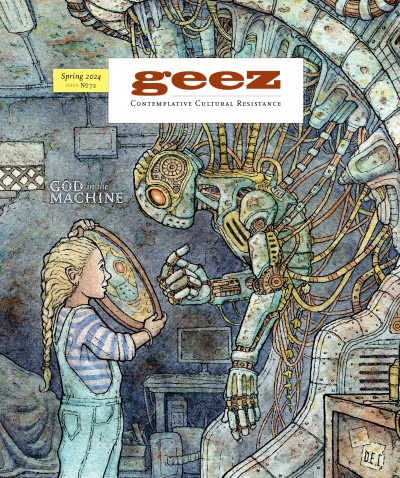Which World Do You Love: A Reflection on Parenting and Technology

Detail of “The Rest of Faun,” Davide Edoardo Cassano, 2023 Graphite on paper, 42 x 29.7 centimetres
One night in the car, I overheard my kids arguing in the backseat over the strengths of oak trees versus cherry trees. At first, I was intrigued by their knowledge and passion for the topic . . .until I realized they were talking about video games.
How did this happen? How had the accidental educational video games during Covid’s initial sheltering-in-place days morph into such regular and constant screen time?
As our kids entered the world of video games, my partner and I worked hard to avoid the most violent ones. I still watched as they fell in love with these other worlds. It wasn’t long before they’d rather be swept into the world of screens than be with company around the dinner table.
As a society, we are pouring trillions of dollars into the technology machine creating worlds more addicting than the real one. We see it everywhere. Phones out all the time sucking us in. I know that I am also culpable.
As I witnessed my kids build worlds in Minecraft, I was surprised by a different grief. They were learning about the strengths of oak, birch, cherry, and maple. They were learning about the elements of stone, lava, and bedrock. They laughed as they named their beloved pigs and built houses for chickens.
I also watched in astonishment as they would open pixelated craft boxes and mix stone with cobblestone and sticks to make an ax. Or craft leather into leather boots. Or string and sticks into a bow and arrows. Or combine eggs, milk, sugar, and wheat to make a cake.
I couldn’t shake the dissonance and sadness I felt in my body. I wanted them to know oak trees by the feel of their bark. I wanted them to know what pigs smelled like. I yearned for them to pick up a carving knife and stick, and make that bow with their own two hands. I wanted them to know the tools of crafting by holding knitting needles or spatulas in their hand. I wanted them to smell that cake and know the feel of the boots on their feet. I wanted their brains and their joy consumed by the very real and tactile world that surrounded them.
What will it mean in the climate struggle if we keep our eyes more attuned to these technological worlds than the one that is slipping away before our very eyes?
For this and many other reasons, my partner and I decided it was time for a digital detox. Two weeks. No screens. No video games. No television. It would be enough time to reset our dopamine levels. That detox went for us grownups too. When we weren’t working, we were off screens. We would stop being more accessible to work or social media than to the children in the room.
It did require of us more willingness to be available for our kids. We crafted together and played board games. We read out loud to them and went on family adventures.
I was so nervous when we broke the news to the kids that we were all going to do this. I knew they would be sad. They certainly were disappointed, but they rolled with it. It turned out to be more incredible than we could have imagined. It was such a dramatic shift in our kids that we extended it for another two weeks. Then, at last, we said they could have one hour each on Saturday morning for screens. That was it. Otherwise, screens could be used for researching or for the occasional family movie night.
The summer of the digital detox, Cedar, who is seven years old, read over 100 books. Isaac, 10, took up baking and leaving the kitchen constantly a mess, but our bellies delighting in his newfound talent. Cedar’s anxiety decreased. They both stopped fighting as much.
We asked the kids how they felt and what they learned after the two weeks?
Isaac said, “We found out what we can do when we aren’t on the screen. I liked getting outside more and spending time with family. It works. Other families should try this.”
Cedar chimed in, “Now I feel like I would rather go to the pond and check on those toad eggs than play video games . . . kind of.”
I am grateful to learn that it is never too late. You can get hooked on screens and realize it’s too much and make a shift.
The world we live in is breathtakingly delicious. Along with my kids, I want to fall head over heels for all that I can smell and touch and see and taste and hear. I don’t want another world besides this one.
Lydia Wylie-Kellermann is an editor at Geez. She lives on Lenape land in Bangor, Pennsylvania. She is the author of the forthcoming book This Sweet Earth: Walking with our Children in the Age of Climate Collapse (Broadleaf, July 2024).



Start the Discussion